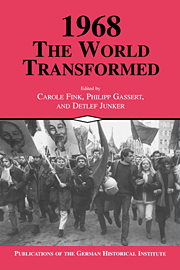Book contents
- Frontmatter
- Introduction
- Part One Tet and Prague: The Bipolar System in Crisis
- Part Two From Chicago to Beijing: Challenges to the Domestic Order
- Part Three “Ask the Impossible!”: Protest Movements of 1968
- 12 The Revolt Against the Establishment
- 13 The Changing Nature of the European Working Class
- 14 The Women's Movement in East and West Germany
- 15 1968: A Turning Point in American Race Relations?
- 16 The Revival of Holocaust Awareness in West Germany, Israel, and the United States
- 17 The Nuclear Threat Ignored
- Epilogue
- Index
15 - 1968: A Turning Point in American Race Relations?
Published online by Cambridge University Press: 05 January 2013
- Frontmatter
- Introduction
- Part One Tet and Prague: The Bipolar System in Crisis
- Part Two From Chicago to Beijing: Challenges to the Domestic Order
- Part Three “Ask the Impossible!”: Protest Movements of 1968
- 12 The Revolt Against the Establishment
- 13 The Changing Nature of the European Working Class
- 14 The Women's Movement in East and West Germany
- 15 1968: A Turning Point in American Race Relations?
- 16 The Revival of Holocaust Awareness in West Germany, Israel, and the United States
- 17 The Nuclear Threat Ignored
- Epilogue
- Index
Summary
In pondering the historical significance of a particular year, historians must resist the temptation to consider everything that happened during that year as crucial simply because they have chosen it as the object of their interest. Given this caveat, does the year 1968 qualify as a turning point in American race relations, that is to say, as a particular point in time when certain developments or trends distinctively changed course?
Obviously race relations - a term that then was still universally associated with the relations between white and black Americans - had been in crisis for quite a while before 1968. Since the mid-1950s the African-American civil rights movement had challenged the southern system of white supremacy by legal, political, and nonviolent direct action. The black freedom struggle triggered a countermovement of “massive resistance” among white southerners ranging from obstruction in the U.S. Congress to brutal mob violence against peaceful protesters and murderous terrorism. The violence in the South had compelled the Eisenhower and Kennedy administrations, however reluctantly, to acknowledge at least some federal responsibility for the protection of black civil rights. Despite bitter opposition from southern lawmakers, Congress passed a succession of federal civil rights bills from the fairly limited Civil Rights Act of 1957 to the sweeping laws of 1964 and 1965, which prohibited racial segregation and discrimination in public facilities and employment and, for all practical purposes, placed the administration of southern elections under federal supervision. The sense of crisis in American race relations was gravely exacerbated and, most important, elevated to the national level by the violent eruption of the black inner-city ghettos in the North, beginning with the Harlem riots of July 1964.
- Type
- Chapter
- Information
- 1968: The World Transformed , pp. 397 - 420Publisher: Cambridge University PressPrint publication year: 1998



